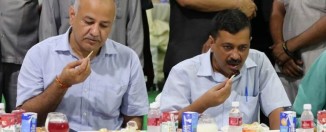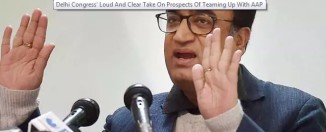Arvind Kejriwal knows the importance of tragedy vampirism:- Delhi demolition:
Arvind Kejriwal knows the importance of tragedy vampirism in politics. Tragedy vampirism, a concept satirised in the 2014 blockbuster Gone Girl, was described by its director as “that thing that happens when righteous indignation gets stoked to the point where we become a lynch mob.”
In Indian politics, every tragedy is a golden opportunity to manipulate emotions and enrage people, every disaster has the potential to turn us into lynch mobs, provided the temperature is raised to the right level.
The stakes become even higher when a tragedy has an undertone of an ideological battle; when individuals are not seen merely as victims of some unfortunate personal tragedy, but as collateral damage of a bigger war of ideas and political philosophies.
Others have played the game in the past, now Kejriwal is playing to the galleries.
Acting with the ease and felicity of a consummate politician, Kejriwal has quickly turned the demolition drive in Shakur Basti into a national event, into yet another televised, twittered battle in the ongoing war between his government and the Centre. By empathising with the plight of the victims, supporting their right to a dignified life and labeling the demolition bestial, he has put his rivals in a spot.
As the BJP watches in consternation, a routine eviction of squatters from an unauthorised slum — such administrative acts are perpetrated daily in almost every corner of India — is escalating into an ideological fight between those who believe in garibi hatao and those eager to remove the garib.
In a battle between garibi hatao and garib hatao, it is a no-brainer that the plaintive cries and televised shivering of those thrown out of their homes on a cold December night will always tilt the balance against those responsible for uprooting people.
There is indeed something inhuman about demolishing the homes of people and leaving them at the mercy of inclement nature without planning their rehab and resettlement. Spend a December night on an open ground in Delhi; if shame doesn’t get you, pneumonia will.
So, Kejriwal will win this round of tragedy vampirism, just as the BJP had won when it used the suicide of Gajendra Singh — remember him?— at an AAP rally to turn all of us into a lynch mob.
Kejriwal can be pilloried for blaming the Centre for everything that goes wrong, for using every opportunity to convince Delhi that the Modi government is their enemy, but since this time he is fighting on the right side of the perception divide, he will pick up some brownie points from the debris of Shakur Basti.
The BJP is indeed politically naive if it thinks a battle-ready opponent like Kejriwal will not pounce on ill-timed — did somebody forgot to tell the Railways officials that it was the peak of winter and Parliament is in session? — administrative interventions. The current narrative in Indian politics is aimed at writing off the Narendra Modi sarkar as a government of and for those in suit-boot. Its opponents will use every opportunity — perceived or real — to push the Modi sarkar in the anti-poor corner. By giving them opportunities on a platter, the BJP will only feed this perception.
Only a few weeks ago, the BJP lost the election in Bihar because the Nitish Kumar-led Mahagathbandhan managed to turn it into a fight between agda and picchda, a fight between haves and have-nots. The success of the strategy has inspired Modi’s rivals to implement it everywhere. That the Trinamool Congress is weeping for victims of the Delhi demolition, fighting alongside AAP in Parliament, is not ephemeral opportunism. It is a well-planned strategy to portray the BJP as a tormentor of the poor before the Bengal polls.
Almost three decades ago, Indira Gandhi had allowed the demolitions at Delhi’s Turkman Gate to turn into a metaphor for her government’s tyranny and excesses during the Emergency.
The BJP has only itself to blame for allowing rivals the chance to draw first blood from similar incidents.





